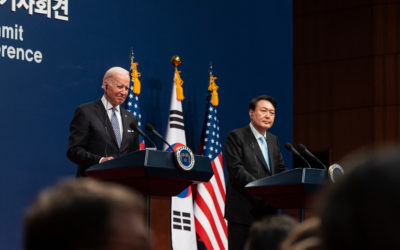On April 26, U.S. President Joe Biden welcomed South Korean President Yoon Suk-yeol to the White House for a summit meeting to celebrate the seventieth anniversary of the U.S.-South Korea alliance and open a new chapter for the next seventy years of expanded cooperation. Amid a substantial list of topics discussed by the two leaders, extended deterrence emerged as the top deliverable.
A more hawkish China policy? 5 takeaways from House committee’s inaugural hearing on confronting Beijing
A more hawkish China policy? 5 takeaways from House committee’s inaugural hearing on confronting Beijing
A more hawkish China policy? 5 takeaways from House committee’s inaugural hearing on confronting Beijing
In a rare show of bipartisanship, Republican and Democratic House members put on a united front as they probed how to respond to the perceived growing threat of China.
The inaugural hearing of the Select Committee on the Strategic Competition Between the United States and the Chinese Communist Party comes at a delicate time – amid concerns in the U.S. over Chinese espionage and tensions over Taiwan and China’s position on the Ukraine war.
Michael Beckley, an expert on U.S.-China relations at Tufts University, was among those watching on as witnesses gave evidence during the committee’s prime-time session. Here are his takeaways from what was discussed.
1. The days of engagement are over
What was abundantly clear from the lawmakers was the message that the era of engagement with China is long past its sell-by date.
Engagement had been the policy of successive government from Nixon’s landmark visit to China in 1972 onward. But there was a general acceptance among committee members that the policy is outdated and that it is time to adopt if not outright containment then certainly a more competitive policy. This would include “selective decoupling” – that is, the disentangling – of technology and economic interests, along with a more robust stance on confronting China’s military and providing a barrier to Chinese conquest in East Asia.
This proposed hardening of the U.S. policy is driven by internal developments in China as well as any perceived external threat. President Xi Jinping is viewed as having installed himself as “dictator for life” and created an Orwellian internal control system, complete with concentration camps and hundreds of millions of security cameras all over the country; this is a regime that is only becoming more authoritarian as the years go by. It has dispelled any idea that with its economic opening China would also become a more open society.
And the committee appears to want to set course for the long term, not just for the near future. The general idea is U.S. policy over the next 10 years could determine the relationship between the U.S. and China for the next century. Rep. Mike Gallagher, the panel’s Republican chair, said as much in his opening comments: “This is an existential struggle over what life will look like in the 21st century – and the most fundamental freedoms are at stake.”
2. Reframing the debate
As Gallagher’s remarks suggest, the panel implied that U.S. issues with China do not boil down to just disagreement over a few issues. Rather, it was framed as a battle between two very different visions of society.
The committee is clearly modeled on the Jan. 6 House panel – for example, by airing hearings in prime time and with dramatic testimony from witnesses. The idea seems to be that the issue is of such importance that to pursue it successfully the U.S. public needs to be educated, invested and mobilized. To that end, the inaugural session had testimony from an activist jailed for two years for supporting pro-democracy movements. The point was to get across the idea that the way of life that the U.S. is trying to promote – both at home and abroad – is antithetical to that of the Chinese Communist Party.
President Joe Biden has similarly framed his administration’s policy around the idea that this is an epic struggle between democracy and autocracy. Indeed, in some ways Biden has been more hawkish than previous presidents on China. In terms of tightening economic restrictions on China and stressing U.S. concerns over China’s human rights record, Biden has picked up the baton from his predecessors and run with it.
But the panel was keen to stress this as a bipartisan push for a more hawkish policy. And this is important. It gives the panel’s recommendations more heft, especially as the U.S. heads into the 2024 presidential race, during which both parties will be looking to stress how tough they are on the U.S.‘s adversaries.
3. Confronting China’s leaders, not its people
Although framed as a battle between democracy and autocracy, the panel appears conscious that the debate shouldn’t be framed as a clash of Western and Asian civilizations.
With anti-Asian sentiment having risen during the COVID-19 pandemic, U.S. lawmakers are walking a fine line here – they will need to focus any criticism on Chinese leaders rather than its people. Gallagher made this point, noting: “We must constantly distinguish between the Chinese Communist Party and the Chinese people themselves, who have always been the party’s primary victims.”
This balancing act may be more difficult in future hearings when issues of Chinese students at U.S. universities, immigration and cooperation with China on certain scientific issues come up. That is when they will need to weigh concerns over Chinese espionage against not coming across as anti-Chinese visitors and immigrants.
4. Reshaping policy on three fronts
Although this first hearing was very much a table-setter, there were three broad policy recommendations implicit in the testimony:
- Taiwan – The panel heard evidence suggesting that the U.S. needs to mobilize for the potential of a hot war with China over the island of Taiwan, the status of which is contested. Former National Security Adviser H.R. McMaster told the panel that in regards to China, the next two years would be a particularly “dangerous” period. He suggested that U.S. capabilities to deter an invasion of Taiwan were not adequate. Meanwhile, there were mentions of a backlog in weapon sales to Taiwan. And as the war in Ukraine has underscored, there is an imperative to get weapons on the ground before any shooting starts.
- Economic competitiveness – The panel heard evidence from the U.S. National Association of Manufacturers pointing out how China had stacked global trade in its favor through unfair subsidies and corporate espionage. To improve America’s competitiveness, the panel could look at recommending the expansion of export controls or tax reforms to make U.S. products more competitive. The U.S. is also eyeing a strategic decoupling with China on the economic front, which is encouraging U.S. businesses to divest from Chinese operations and restricting Chinese businesses operating in the U.S., such as the social media platform TikTok.
- Human rights – The committee made it clear that human rights should be front and center in the U.S. China policy going forward. The hearing repeatedly stressed that this was not just an economic and security disagreement but a clash of values.
5. A boilerplate response from Beijing
China’s response to the committee’s inaugural hearing was standard.
In a statement, the foreign ministry in Beijing said it rejected Washington’s attempt to engage in what it called a “Cold War” mindset. Chinese media also tried to make it sound as if anti-China policy is driven by special interests, including defense contractors and members of the Taiwanese diaspora.
The narrative that the U.S. is warmongering was aided by the interjection of two protesters from the Code Pink activist group, who held up a sign during the hearing stating that “China is not our enemy.”
Republished from The Conversation under a Creative Commons license to point warfighters and national security professionals to reputable and relevant war studies literature. Read the original article.

Michael Beckley is an associate professor of political science at Tufts University and a Jeane Kirkpatrick Visiting Scholar at the American Enterprise Institute.
His research on great power competition has received awards from the American Political Science Association and the International Studies Association and been featured by numerous media including the Financial Times, Foreign Affairs, Foreign Policy, the New York Times, NPR, and the Washington Post.
Previously, Michael worked for Harvard’s Kennedy School of Government, the U.S. Department of Defense, the RAND Corporation, and the Carnegie Endowment for International Peace. He continues to advise offices within the U.S. Intelligence Community and U.S. Department of Defense.
Michael holds a PhD in political science from Columbia University. His first book, Unrivaled: Why America Will Remain the World’s Sole Superpower, was published in 2018 by Cornell University Press.
Related Articles
President Marcos Jr. Meets With President Biden—But the U.S. Position in Southeast Asia is Increasingly Shaky
Over a four-day visit to Washington, Philippine President Ferdinand Marcos Jr. has been welcomed to the White House and generally feted across Washington. With President Biden, Marcos Jr. (whose father was forced out of office in part through U.S. pressure, and whose family has little love for the United States) affirmed that the two countries are facing new challenges, and Biden said that “I couldn’t think of a better partner to have than [Marcos Jr.].”
The U.S. is about to blow up a fake warship in the South China Sea—but naval rivalry with Beijing is very real and growing
As part of a joint military exercise with the Philippines, the U.S. Navy is slated to sink a mock warship on April 26, 2023, in the South China Sea.
The live-fire drill is not a response to increased tensions with China over Taiwan, both the U.S. and the Philippines have stressed. But, either way, Beijing isn’t happy – responding by holding its own staged military event involving actual warships and fighter jets deployed around Taiwan, a self-governed island that Beijing claims as its own.



